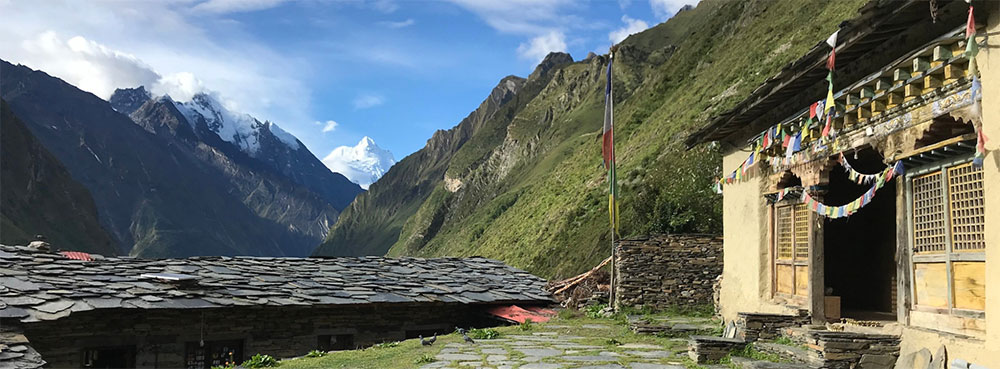
Location
Kathmandu, Tsum Valley, Nepal
Program Description
Information Sessions
February 10, 2026
6:30-7:30 p.m.
Virtual Meeting Link
Password: 145277
February 11, 2026
11:30 a.m. - 12:30 p.m.
EnGEO 2140
This four-week, six-credit program introduces students to the diverse environmental landscapes and rich cultural heritage of Nepal.
Combining adventurous experiential learning with a human-environment analytical framework, the program focuses on everyday experiences with climate change, biodiversity conservation efforts, and sustainable development in one of the world’s most rapidly changing countries.
Students and faculty will first spend several days exploring the ancient temples, historic palaces, and colorful bazaars of Kathmandu, before embarking on a 4-5 day trek to Tsum, a mountainous valley in the Manaslu Conservation Area. In Tsum, we will engage with the local Indigenous community to study the challenges, successes, and limitations of integrating traditional ecological knowledge into climate change adaptation and infrastructural development efforts. Specifically, we will examine the impacts of melting glaciers, rising temperatures, shifting tree lines and species habitats, and changing agricultural practices, and how these environmental changes are interconnected with socio-cultural transformations in Buddhist mountain landscapes.
Program Highlights
• This program offers a field-based research experience focusing on the human dimensions of climate and environmental change in the Nepal Himalaya;
• Students will explore themes of vulnerability, adaptation, and resilience to deepen their understanding of sustainable development;
• A typical day includes a morning session for discussing readings and planning the day’s activities, an afternoon community-based outing, and an evening session for reflection and free time for reading and writing;
• Students will have the opportunity to attend informative guest lectures by Indigenous knowledge holders, local scholars, conservationists, and development planners;
• Visits to cultural-educational institutions like the Taragaon Museum, Photocircle, and Kathmandu Jazz Conservatory, as well as UNESCO sites are included;
• The program teaches qualitative ethnographic fieldwork methods, including participant observation, interviews, storytelling, and writing engaging field notes and texts;
• Students will develop and conduct their own research projects;
• Throughout the course, faculty will guide students in engaging with local communities, partners, and the environment in relational, responsible, and reciprocal ways;
• The program encourages openness to new ways of knowing and being in the world;
• Upon returning to JMU, students will reflect and debrief as a group on their study abroad experience.
Location Description
The program will begin in Kathmandu, the capital city of Nepal, and then move to Tsum, a high mountain valley in the Manaslu Conservation Area near the bordering Tibet.
Director
Nadine Plachta | plachtnx@jmu.edu | SIS - Geography
Galen Murton | murtongb@jmu.edu | SIS - Geography
Accommodations
Students will stay in a combination of local guest houses and hotels throughout the program. Most accommodations will feature shared double rooms and internet access. While hotels in Kathmandu will provide hot showers and laundry facilities, local guest houses in the mountains will be more basic, reflecting the local way of life.
All meals are included during the trip. Students will have group meals at local guest houses, hotels, and restaurants. Additionally, they will receive stipends to cover other food costs.
Additional Items to Consider
A visa is required to enter Nepal, and detailed instructions for the application process will be provided during the pre-departure orientation sessions.
For phone services, we recommend that students purchase SIM cards from Ncell, a major provider in the country, or use an international phone plan.
This program is intensive and demanding, involving extensive travel and hiking in remote regions at altitudes up to 11,000 feet. Please note that some accommodations may have minimal facilities, such as limited access to running water or electricity. A detailed packing list will be provided upon acceptance into the program.
Ensure you are up-to-date on all routine vaccines before the program. The Centers for Disease Control and Prevention (CDC) recommends vaccinations for Hepatitis A, Hepatitis B, and Typhoid for unvaccinated travelers aged one year and older traveling to Nepal. Additionally, be aware that dogs infected with rabies are commonly found in the country.
For more information, please visit the CDC website: https://wwwnc.cdc.gov/travel/destinations/traveler/none/nepal.
Applicant Criteria
Applicants must have a GPA minimum of 2.0
Open to all majors and class levels, including graduate students
Application Process
This list serves as an application preview. To apply, students will need to complete the following:
- Study Abroad Online Application ($40 fee)
- Short Essay
- Resume
- Participation in an orientation session is required.
Further details and instructions about these application requirements will be available upon log-in.
Application Deadline
Dates
All dates are tentative and subject to change
Courses
GEOG 350: Topics in Geography: Climate and Society in South Asia (3 credits)
GEOG 491: International Studies (3 credits)
Courses listed here are to be used as a general guideline for program curriculum. *All courses are considered pending until approved by the Academic Department, Program, and/or College.

